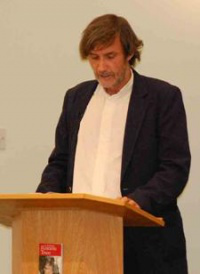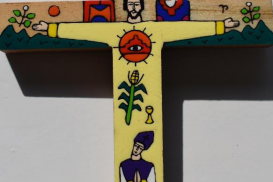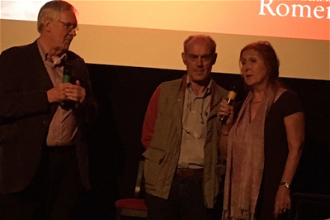Text and audio: Fr Tommy Greenan on Archbishop Romero

Fr Tommy Greenan
Fr Tommy Greenan, a priest of the Archdiocese of Edinburgh, currently working in Central America, gave the following lecture recently on a tour of England and Scotland. The text follows, or you can also hear a recording of Fr Tommy's lecture in Edinburgh here: www.lauriston.org.uk/index_files/romero2010.htm
PROLOGUE
Rodolfo reminded me of Don Quijote. He always gave the impression of ‘the man of the sad visage, his features and demeanour portrayed sadness’. His Wellington boots that he always wore added to this configuration. In a way we could consider Rodolfo as a prototype of a Salvadorean rural worker, forced into exile by soldiers’ persecution which was unleashed throughout the decades of the seventies and eighties. Vulnerable, the peasants hid in the hills until they crossed into neighbouring Honduras and took refuge in the refugee camp of ‘Mesa Grande’.
In August of 1989, under the protection of the United Nations and other humanitarian organisations, hundreds of these refugees returned to El Salvador, the land of their birth, and rebuilt the houses that had been destroyed and tilled the soil that had been abandoned and neglected in war zones. They came during the war in the hope of remaking their lives, broken by violence of a bloody civil war. Rodolfo’s community was called ‘Teosinte’, named after a plant, or perhaps a weed, because a weed is a flower out of place. Teosinte was surrounded by pine trees and mountains in the jurisdiction of San Francisco Morazan, in a war zone.
One dark night, in the church of Teosinte, beneath the tenuous light of a Coleman lamp, I remember that during the homily we started to speak about Archbishop Romero. I was surprised to see Rodolfo’s hand go up. He was normally shy and was loathe to speak in public. He asked to speak. On that memorable night, with pride in his voice, Rodolfo told us ‘I shook hands with Archbishop Romero on two occasions’. Then he sat down.
He had gifted us a precious homily on Archbishop Romero. He had shaken the hand of ‘Monsenor’ and had felt the benefit of having done so. Archbishop Romero enhanced Rodolfo’s life.
One day in 1992, nearing the end of the civil war, Rodolfo took his son and set off to repair his own house, on his own land, in a far off community which had been abandoned owing to the civil war. He intended to live there, in his place of origin. He wanted to find his ‘umbilical cord’. Exiled Salvadoreans would often speak of ‘going to find their umbilical cord’ buried with the placenta in a corn field. This was their way of saying ‘I’m going home’ to my place of origin.
Accompanied by his son, Rodolfo climbed onto the roof to replace loose and broken tiles of his mud house and he accidentally touched a booby trap and the explosion of the artefact killed him instantaneously. His child survived.
I’ll always remember Rodolfo as a man with the sad visage and drooping moustache who shook the hand of Archbishop Romero on two occasions, and had felt the benefit of having done so. And I hasten to add that Rodolfo enhanced the life of Archbishop Romero on two occasions.
THE THEOLOGICAL PERSPECTIVE
In three short years, and many long (but agreeable) homilies, Archbishop Romero fulfilled his role as the People’s Catechist, as the teacher of their faith. His Cathedral turned out to be the locality for a ‘family gathering’ where the father instructs his children and enlightens them with his wisdom. The people eagerly waited for this affirmation from their ‘father’ in God whom they called respectfully ‘Monsenor’. But for the oppressors and murderers the words of San Salvador’s bishop were darkness and condemnation.
They were strong words minutely prepared in consultation with his team of advisors, and minutely prepared in prayer to God. They were never words of street chatter or conversations pertinent to a classroom, or to a dining hall. No. They were serious words echoing the will of God in unrepeatable historical circumstances, spoken in the spirit of Jesus Christ. These words spoken by Archbishop Romero came from him, but they transcended him, because they were the word of God. He had grasped that word and the word took possession of him. He was a prophet possessed by the Spirit of God, and his words continue to be Sacramentum Verbi, sign of the divine presence.
Archbishop Romero expounded to simple people a sort of summa theologiae, a spreading out of the most prominent points of theology, with the intention of strengthening the people’s humanity and Christianity within a very dangerous situation. To the common people he communicated his own understanding of God and his Christ, and of the Church, in the middle of the perplexities of gory reality. Each Sunday Archbishop Romero would proclaim passages from Sacred Scripture in accordance with the liturgical cycle, but he did not concentrate solely on a specific text, treating it as a thought for each reading he would rather treat Sacred Scripture in its totality, as ‘a love letter’ sent by God to strengthen, orientate, and express fondness for his people. Romero’s preaching was an ecclesiology expressed with the aim of opening people’s eyes and animating their hearts.
And this pilgrim people, great in their humility, responded to him by prompting the course of each homily with applause and approval filled with tenderness and support. The eloquence of their anointed prophet caused commotion and the spontaneous reaction of clapping.
THE ARTICULATION OF FAITH AND LIFE
For Archbishop Romero, Christian faith and daily life formed a symbiosis, an inseparable unity. The objective of his homilies was to place the people in an ambience of vitality in order that they be transformed in accordance with the Gospel message. The words spoken by Archbishop Romero were incarnated in Salvadorean reality, in the hope of stirring the people in radical change towards love and non-violence, turning their present situation of cruelty and murder into one of justice and peace. Romero’s word was not ethereal and disincarnate because Archbishop Romero knew well that in the preaching of the Word of God we cannot and should not ignore historical reality. The Word interpolates and impels us to commitment, and if it fails to do this it is not the true word of God. This means that the orthopraxis of Christianity (its doctrine and its practice) is neither ethereal nor spiritualist. For Archbishop Romero, the explication is always applicable to the circumstances of daily living.
DISCERNMENT OF EVENTS IN ACCORDANCE WITH THE GOSPEL
The Second Vatican Council declares: I quote ‘It behoves the Church to scrutinise always the signs of the times and to interpret them in the light of the Gospels’. And this same paragraph points out the affliction of hunger and misery as the sad signs of our times, adding that poverty is also a lack of spiritual goods such as, for example, the right to education. ‘The number of illiterate people is innumerable’, the Council document states.
On scrutinising the signs of the times in El Salvador, Archbishop Romero was well aware of the existence of people suffering extreme hunger, and of people being illiterate. He was aware of the lack of land for landless, rural folk whose vocation it was to till the soil and produce its fruits for sustenance, for survival. The poor people had no health care and no dignified housing and other basic needs for human existence, such as easy access to running water. Romero witnessed the inhuman conditions of the marginalised as opposed to the luxurious living conditions of the rich. This was a sad reality. In the same nation the super-rich were opposed to the very poor. The very rich created the very poor and the very poor created the very rich. In the early seventies, when the rural folk formed associations on a large scale to reclaim peacefully and politically their fundamental human rights, the oligarchy by means of their military and police, repressed the voice of discontent with violence, killing the political leaders of the people’s organisations thus weakening the coordination of these organisations. With the intention of ‘legitimizing’ their repressive violence, there was promulgated in the Congress of El Salvador ‘the Law of Public Order’ which prohibited the existence of the people’s organisations, and so there began a time of extreme cruelty against people organised and defenceless.
God is the God of life, because all life is the fruit of the Creator’s love. Therefore, no human being has the right to destroy the life of another human being, because that life is sacred, it belongs only to God its Creator. ‘Thou shalt not kill’ is the command of God that protects the divine image, and the Church, a sign that seeks to bring about the plan of God in the world must defend human life when it is in danger of being trampled upon. Human life is sacred, the personal property of God. Even the life of the sinner is sacred, albeit not holy, because he or she is also fruit of the divine Creator. For Archbishop Romero, human life is the greatest gift God gives, therefore human life has to be cherished and defended obstinately; Romero says, I quote, ‘What a grievous offence to the Creator is the destruction of human life! No matter its source, violence that kills is sinful’. In other words, the Church only cares about humanity and creation.
As Romero puts it, I quote, “The human being is a child of God. For this reason it hurts when we find corpses of those tortured, made to suffer pain before being murdered. For the Church, the goal of all its projection has to be precisely this: the human being. Each and every human being is a child of God and in every human being killed there is Christ sacrificed and venerated. I want to remind you one more time, that all life is sacred and that only God may dispose of it. It’s sad to read that in El Salvador the two principal causes of the death of Salvadoreans are, first, diarrhoea, immediately followed by assassination. We die through being wounded by gunshot or knives. These are the statistics. Therefore, immediately following signs of under nourishment, diarrhoea, there follows indication of crime: assassination. These are the two ‘epidemics’ going around and killing our people”.
Archbishop Romero denounced the cold-blooded assassination of four members heading a rural co-operative. He unmasked the lies by which the murderers tried to cover up their evil. In his Sunday homilies he always gave the dead the dignity of their names. He states, ‘the murder of four leaders belonging to the Federation of Rural Workers: Apolinario Serrano, Jose Lopez, Patricia Puerta de Garcia and Felix Garcia Grande (…). There were no blood stains within the vehicle (…). The ‘official investigation’ says they were carrying weapons and were intending to attack the barracks which housed at least three hundred soldiers inside, all of them armed (…)’. Four unarmed cooperative workers against 300 soldiers? The lunacy of the military’s cover-up! The truth is that four unarmed cooperative workers were stopped at a military check-point, taken to the barracks , tortured and murdered.
Archbishop Romero pointed out the military tactic of killing the leaders of Trade Unions and co-operatives with the intention of stifling the voice of the people. On this occasion, Romero repeated his words once more that violence cannot be ‘deified’, by turning it into the only way to bring about justice.
Archbishop Romero also included abortion as murder, stating: ‘Sisters and brothers, it’s a crime to take the life of a child in the womb’. The one who tortures another human being (…) has offended the image of God.
Merely a month before his own assassination, Archbishop Romero denounced Major Roberto D’Abuisson and backed the allegation of the Christian Democratic Party whose leader, Mario Zamora, had been murdered after having been accused on Salvadorean television by Roberto D’Abuisson of being ‘communist’. Romero, in his Sunday homily, denounced D’Abuisson as the instigator of the politician’s assassination. Zamora was killed at home, in cold blood in front of his wife and children. This outright accusation hastened Romero’s own execution. He stated explicitly the facts, wanting to let the nation know that Major D’Abuisson and his band of killers belonging to the political far right had murdered Mario Zamora. And this act of denouncing D’Abuisson sealed Romero’s destiny as a prophet and martyr.
A THEOLOGICAL – PASTORAL EVALUATION OF ARCHBISHOP ROMERO’S HOMILIES
The first and most important observation of Romero’s homilies is that he sought to save lives, by changing the hearts of those who tortured and killed others, because life is the maximum we have and it’s the minimum also. I believe that, historically, Romero is situated solidly in the patristic, episcopal tradition of the Church, alongside Basil the Great of Capadocia, Saint Ambrose of Milan, and Saint John Chrysostom of Constantinople. These men, like Archbishop Romero lived simple, but austere, lives. They were self-effacing. Their spiritual praxis was asceticism, self annulment. There was a practice of asceticism among these saints: Basil, Ambrose, Chrysostom and Romero. Romero’s Vicar General, Monsignor Urioste, found a cilice in the desk of Archbishop Romero. This contraption produces pain when placed tightly on the thigh, the cilice is a garter that presses the thigh skin and causes penitential pain.
Similar to Basil of Capadocia, Oscar Romero lived in an institute which sheltered and cared for the sick. Romero lived in a hospice for women dying of cancer.
Similar to these three bishops, Romero set out to defend the poor against the greed and exploitation of the rich, not caring that the rich think badly of him on account of his criticism of their greed. Romero never feared being ostracised by society’s powerful. He was as courageous as Ambrose who excommunicated the Emperor Theodosius in the wake of Theodosius having ordered the massacre of thousands of poor people in Thessalonica because they protested against exorbitant taxation by the Emperor.
Chrysostom (a name meaning ‘Golden Mouth’) criticised the Empress Eudoxia for her meanness to the poor and her extravagance in dress. Romero belongs to this patristic lineage.
These four bishops (Basil, Ambrose, Chrysostom and Romero) are prophetic voices favouring the universality of the goods of creation. The things of the world are for everyone to enjoy; they are not for the exclusive use (or abuse) of those economically and politically dominant. Like Chrysostom, Romero suffered martyrdom for defending evangelically the weak. The tempestuous episcopacy of Chrysostom in Constantinople ended with his being exiled, and martyred through exhaustion and ill-treatment at the hands of the Emperor’s soldiers near the Black Sea. Archbishop Romero was also martyred for his commitment of deep mercy for the victims of the state repression in El Salvador. A single shot ended his life while celebrating the Eucharist in the chapel of the cancer patients he served.
The Jesuit, Ignacio Martin-Baro (who himself was later to be assassinated by the Salvadorean military), said, ‘Archbishop Romero died as he had lived, as a priest. That is to say, offering his life as a prolonging of Christ’s sacrifice’.
Remember that Romero said to Boff, ‘We need to give our lives in order to protect the lives of others; this was the path of the Crucified One’ (and it was the path of Archbishop Romero).
LIFE IS SACRED….
It belongs to God. Life is not necessarily holy, it belongs to us
Defending and fomenting the life of the Salvadorean people oppressed by the rich and powerful became the meaning of Archbishop Romero’s ministry. In February of 1979 in Puebla, Mexico, he met the Brazilian theologian Leonardo Boff. Boff remembers that encounter. ‘Romero’, he says asked him for some theological ideas on the theme of life. Boff recalls, ‘I remember very well how he spoke in a soft, gentle voice saying – ‘In my country they kill with cruelty. The poor are murdered; simple rural folk are tortured from day to day with the most extreme violence. We need to protect the minimum, which is God’s greatest gift, LIFE. Father Boff, help us to develop a theology of life. God is Creator of life. He sent his Son so that we would have life in abundance’.
After a pause, as if he were reliving the experience of the corpses he had buried, he concluded, almost with an air of resignation, ‘We need to give our lives in order to protect the lives of others: this was the path of the Crucified One’
In the same line, Romero continues:
‘How offensive it is to the Creator to trample down life’ – [24 June 1977]
No matter who be guilty, the violence that takes life is sinful. The Church is only interested in the human being. The human being is the child of God, and for that reason it hurts to find corpses, tortured, people murdered. For the Church, the goal of all its intention has got to be the human being. All human beings are children of God. ‘In every human being murdered there is a Christ sacrificed who is held in veneration. I want to put it on record once again, that only God can dispose of human life’.
‘Life is sacred, but not always holy’.
Romero knew that our best intentions go to rue and remain unfulfilled at times. He said ‘Life is sacred, but not always holy’ – (this is because we’re all sinners).
FIGURES OF SPEECH
On ‘The Mound’ in Edinburgh there are slabs on the ground with quotations of poets engraved there. I was struck by the quote from George Mackay Brown – ‘In the fire of images I gladly put my hand’. Romero gladly put his hand in the fire of images.
Archbishop Romero’s success as a preacher was partially on account of his gift of metaphor. He spoke in metaphor, relating happenings. He would illustrate in a picturesque manner the point he was making. Here are examples:-
‘The acorn husks eaten by pigs don’t fill a human being’s stomach’ – 11 September 1977 [The attraction of earthly pleasures don’t fulfil you]
‘There’s no sin more diabolical than stealing the bread of someone suffering from hunger’ – 24 February 1980 [Greed is bedevilment]
‘The Church persecuted resembles those rocks in the sea. Battered by the waves, they gush out pearls’ – 29 May 1977 [The paradoxical blessedness of persecution]
‘That senseless monster kicking rock (=Church) doesn’t damage the rock, but its own foot, its own self’ – 11 September 1977
‘Sin springs like a serpent when it is squeezed underfoot’ ‘This Church of ours is like a spouse yearning for her absent husband, she sighs for his return’ – 25 November 1977
[Christ absent in the Church] ‘The sun is not to be blamed for finding, in the very purity of its illumination, puddles, dung and the rubbish of this world’ – 13 November 1977 (God is not to be blamed for what we do with his creation)
‘Our preaching, going against the current, is like ploughing the sea’ [ It is futile to plough the sea]
‘The fault of a bad portrait resides not in the photograph, but in the object it treats’ – [15 January 1978]
Romero insulted the Institution for Agricultural Reform (ISTA), by stating correctly that it is ‘a circus lion without teeth’ with no Government authority to bring land reform to El Salvador.
‘When someone sticks his hand in a pot of salted water, if the hand is sound nothing happens, but if he has even a small cut on it, the hand in salt water will sting – 24 June 1979 (The hand bloodied by violence is not sound)
‘Nobody likes his wound poked at’ – 15 January 1978 [Reprisals]
‘In the presence of a saint the shades are banished, justice is evoked, violence breaks out and they take his life’ – 24 June 1979 [Goodness clashes with evil]
‘Spit at the heavens and it will fall back on you’ (Don’t put God to the test)
‘The wild animal stalks unchecked and thirsts for blood’ – 12 May 1977 [Warning to Romero?]
Romero points out that the condition of El Salvador is ‘like a cask of gun powder ready to explode at any moment’ – [29 July 1979]
He warned the army and the rich: ‘You are shutting down the valve that releases steam, that prevents an explosive situation from happening’ – 12 August 1979. (No space to protest injustice: arrest, torture, murder) ‘Don’t you think, sisters and brothers, that this free movement, this shuffling dance of millions of dollars in our country, is an insult to the poor of El Salvador?
And as a warning to the rich and powerful, Archbishop Romero stated clearly to them what Pope Paul VI had said previously to a group of wealthy entrepreneurs: ‘Know how to take off your rings or else they will take off your fingers’ - 6 January 1980.
SUMMARY (TAPE) & FINAL WORDS
A quotation from Archbishop Romero in his penultimate homily, given in the Cathedral on 23rd March 1980, the day before his assassination:
Listen to these words in English and then listen to them on the tape with Archbishop Romero himself speaking them in the Cathedral of San Salvador in Central America.
‘I would like to appeal in a special way to those within the ranks of the Army and, more specifically, to those in the National Guard and the Police Force:
Brothers, they are our own people! You are killing your own brothers and sisters, peasant folk, rural workers …. And faced with an order to kill, that a human being gives, there ought to prevail the Law of God which states: ‘Thou shalt not kill’. No soldier is obliged to obey an order against the Law of God. Now is the time for recuperating your conscience.
Obey your conscience and not the order to sin. The Church, defender of the rights of God, of human dignity, cannot possibly remain silent before such an abomination. We want the Government to take seriously the fact that ‘reforms’ do no good whatsoever if they be soaked in so much blood.
In the name of God, then and in the name of this suffering people whose lamentations arise to the very heavens, I plead with you, I beg you, I order you, in the name of God, stop the repression!’


















